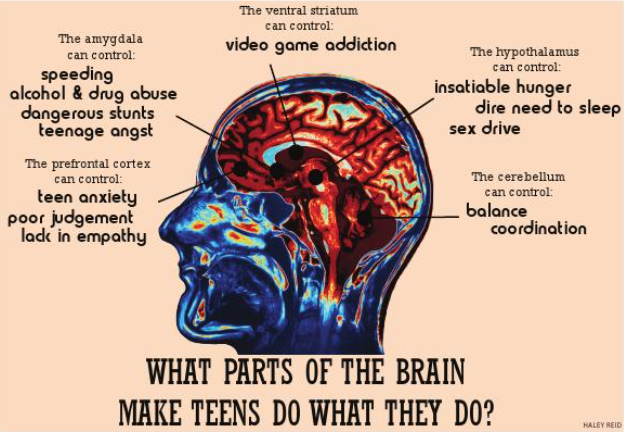Study reveals IQs can change in teen years
Compare your average freshman to your average senior. If you look beyond the obvious physical differences, you will see evidence of endless disparities in maturity level, behavioral patterns and decision-making skills. Why and how is this so? Researchers have been asking that very question.
A revealing study published April 22 in The Washington Post shows that through teenage years, a person’s IQ is malleable — meaning it is subject to fluctuate based on individual choices.
In “Why are teens so obvlious to the pile of dirty clothes on the bedroom floor?” neurologist Frances Jensen explained her study of the enigmatic teenage brain. She discusses science previously known such as the incomplete development of the prefrontal cortex, the decision making center of the brain, which makes teenagers’ behavior more erratic than that of adults. She then debunks the traditional belief that IQ is fixed and unchangeable, which is what makes this study so important.
“We do have control over IQ,” AP Psychology teacher Jennifer Weisbrodt said. “I think that a lot of students come into this thinking you either have it or you don’t — some people are just giving this wonderful genetic combination that allows them to be ‘smart,’ you know, and that’s not the case.”
Jensen’s study emphasizes the effects of destructive behavior such as abusing substances like marijuana and alcohol. These are the most detrimental and most common cause of IQ decline. Combating these influences is at the forefront of the neurologist’s goal in publishing her findings.
“The teenage brain is developing rapidly, and disruptions to that development, including toxins such as drugs and alcohol, may be detrimental. Changes in the course of teenage brain development may result in addiction problems lasting into adulthood. It may also result in other mental health issues and/or learning difficulties,” school psychologist Christine Kuhl said. “Being under the influence of any drug also increases risk-taking behaviors, which may lead to injuries, legal problems and even fatalities. Teenagers between the ages of 15 and 19 are six times more likely to die as a result of injury than their 10- to 14-year-old counterparts.”
Pediatric neurologist Iqbal Allarakhia wants students to take away from these findings that it is never too late for them to promote healthy brain growth, and it’s not as hard as one may think. Anything from traveling to reading can positively affect your brain activity and potentially increase your IQ score. Healthy practices such as getting adequate sleep and exercising regularly can promote both emotional and mental well-being, Allarakhia said.
Likewise, Weisbrodt took a positive view on the story. She feels its purpose is to highlight students’ potential more than threaten them with the possibility of their intelligence decreasing.
“The teenage brain is easily influenced — it’s easily influenced by drugs, but likewise it’s easily influenced by what’s going on around it,” Weisbrodt said. “That’s the beauty of being a teenager.”
Weisbrodt doesn’t think the study overemphasizes the brain’s malleability.
“That’s the joy of teaching teenagers … your brain is open and ready to learn and to go into multiple pathways,” she said.
Allarakhia believes that not all teenagers know that their behavior may affect their intelligence and that these findings will help decrease ignorance among teens so they can become more conscious of the lasting effects of their actions.
“Some of them may know, but the majority including teenagers and young adults are unaware of this association,” Allarakhia said. “Therefore they continue to engage in such behaviors which negatively affect them and their well-being.”
In the heat of being young. teenagers sometimes forget the overarching consequences their actions can have on their brains. Knowing the background and research of this study and others like it can shed light on how changing aspects of their lives can promote healthy brain growth.
“It kind of makes me want to really focus on learning my language, like learning French right now,” senior Sara Fresard said. “And I want to try to learn more languages maybe, or just travel more because I’ll be able to pick it up more easily since my brain is so malleable.”
Because IQ is extremely impressionable until a person is in his or her mid-20s, high school isn’t the defining moment in one’s intellectual capacity. There’s still time to broaden one’s horizons in college and beyond and even see measurable increases in IQ.
“I’d say I just would want to make the most out of my 20s … I just want to make the most and just strive for greatness in my early 20s,” senior Joe Ciaravino said. “It (the study) just makes me think more about what I’m gonna do, like what I need to do early in life, and just make those critical decisions early in life.”
Through better understanding of how the teenage brain develops, students can feel empowered to have impact on their intelligence. They aren’t stuck with one IQ score.
“The good news is it’s good for all teenagers,” Weisbrodt said. “We’re not defined by our IQ, but we could certainly increase it if that’s something, you know, that you think is important. So, bad decisions don’t define us, poor test scores don’t define us, we have control over that, and I think that’s a really good feeling to know that and to know that it’s actually backed up by science and brain research.”







